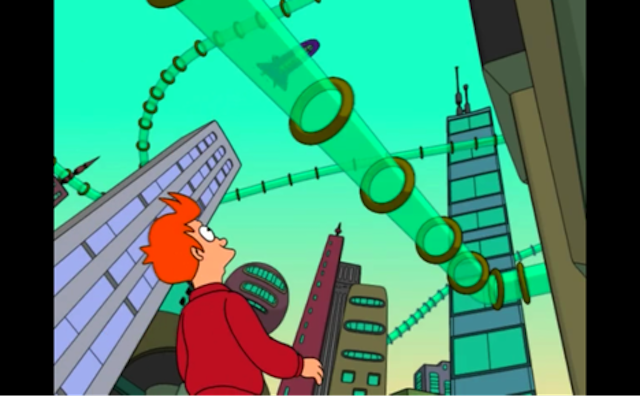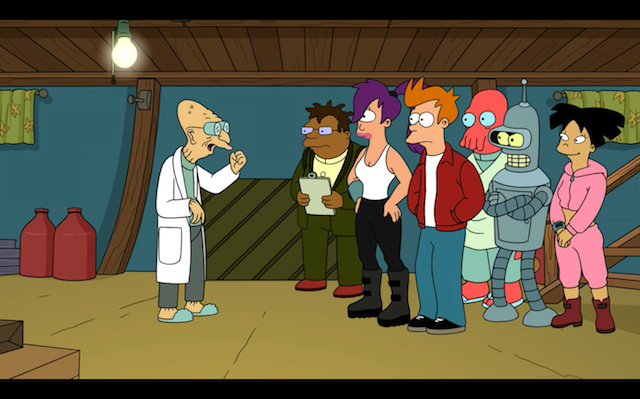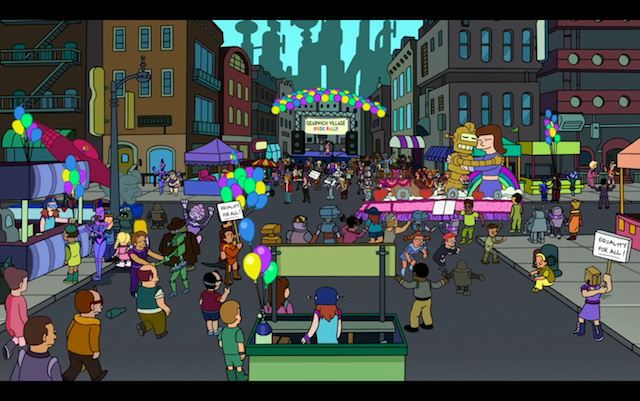15 From Alcoholic Robots to Robosexuality: The Usage of Robots in Futurama
Sam Bishop
Futurama is a sitcom that aired from 1999 to 2003 on Fox, was on hiatus from 2003-2008, and then was revived from 2008 to 2013 on Comedy Central. The show is based around Philip J. Fry, a pizza delivery guy from 1999 who is cryogenically frozen (by accident) until the year 3000, and his adjustment to life in the 31st century. The show typically focuses around science and/or science fiction, but when dealing with more socially and culturally relevant topics, it accurately highlights the strengths and flaws of life in the 21st century. Futurama acclimates mainstream viewers to progressive ideology in an indirect way because the behaviors portrayed in the show are ahead of their time.

Futurama is an animated series that aired during prime timeslots, but it would not have been successful without the prime-time animated sitcoms that preceded it. In the 1960s, The Flintstones was the first animated sitcom to stay on the prime-time slot for longer than a season, and its adult-targeted content allows it to do so. “John Mitchell, vice-president at Screen Gems, suggested that Hanna-Barbera develop a cartoon aimed at adults, and this soon gave rise to the development of The Flintstones… The show was greeted with mixed reviews but high ratings” (Hilton-Morrow and McMahan 75-76). After the cancellation of The Flintstones, prime-time animation dwindled away. In 1989, creator Matt Groening worked with James L. Brooks to create The Simpsons as an adult-focused animated sitcom. Although it aired at the same time as The Cosby Show, it was still very popular and successfully reached its target demographics (Hilton-Morrow and McMahan 83). After Groening’s success with The Simpsons, FOX wanted another successful show. Groening then created Futurama, a show that “won its time period in most key demographic areas, including adults ages 18-49, adults aged 18-34, adults aged 25-54, men and women aged 18-49, and teens” (Hilton-Morrow and McMahan 86). Groening had created a second wildly popular show.
There are a variety of characters in Futurama, and I believe that each character adds something to the show. Philip J. Fry, better known as Fry, is a lazy, somewhat dumb, and immature delivery boy with a well-meaning heart. Because he is from the 20th century, he points out the changes from the 20th century to the 31st century. Fry’s girlfriend and Planet Express pilot Turanga Leela is a mutant. Mutants like her are outcasts of society, and she captures the struggles of being an outcast. The relationship between Fry and Leela, offers commentary on modern and outdated facets of relationships. Fry’s coworker, Amy Wong, is rich and has a conceited attitude over her less fortunate coworkers. Fry’s relative, Professor Hubert Farnsworth, adds science and math-related jokes to Futurama. He comments on issues such as global warming, deforestation, and genetic modification. The manager, Hermes Conrad, highlights the excessive nature of bureaucracy, the struggles of obesity, and the ineffective markers of masculinity. Last (and to the crew, least) is John Zoidberg, an anthropomorphic crustacean-based alien whose well-meaning but inept nature causes many problems for the crew.

Robots serve a different purpose in Futurama. Robots parallel humans in every way except appearance. In the 31st century, robots feature all shapes, models, sizes, ethnicities, religions, and personalities. Robots stand in for humans for two reasons. First, robots parallel humans because, in the 31st century, the humans have progressed way past the modern way of life in the 21st century. Humans rarely see race, human-against-human war is rarely an issue, and people are free to spend their spare time however they please. Although they have figured a lot of things out, their society is not a utopia either. Everyone has a career chip that tells them which job they have. Its bureaucracy is incredibly tedious. Humans mistreat mutants and condemn them to sewers with radioactive waste. Earth’s military, led by fearless coward Zapp Brannigan, attacks almost anyone who lands on Earth, hostile or otherwise. Brannigan is a warmonger, but he’s a coward when he has to fight. The President of the Earth is Richard Nixon’s head, and the Presidency is sponsored by the delicious taste of Charleston Chew. When it comes to humans, the show’s universe is bizarre and unrelatable.
To better relate to its audience, Futurama introduces us to the culture of robots. Robots have many of the same careers and social entities that humans have. Depending on the model, some robots act, perform factory labor, work in civil service, practice medicine, preach, know everything about cultural holidays, or enforce the law. There is a religion, Robotology, that helps people evade their sins, and charities are in place to make sure homeless robots can still function. Although the robots’ society may seem wholesome on the surface, there are also robots that occupy the underbelly of their society. Many robots are pickpockets or alcoholics. Some pay Hookerbots for all sorts of sexual activity. The Donbot leads the Robot Mafia, and Clamps acts as his muscle. The robot known as Roberto is designed to be insane, and he has a fascination with stabbing and murder. Other robots just want to kill all humans. On top of all of this, most of the robots are owned by Momcorp, a company run by a seemingly old and frail woman (in public) who really is a power-hungry sociopath (in private) who does whatever is necessary to get what she wants. She has no regard for life, robot or otherwise, and she sacrifices whatever she can to achieve her goals. In short, robot society is not nearly as well-run as human society, but this is intentional. Futurama points out the flaws in our society by paralleling it with a less-functioning society of robots; however, sometimes the robots offer up alternatives on social issues that promise better futures for modern society.
In Futurama, robots are powered by alcohol. When consuming alcohol, most robots become better individuals. They tend to be less selfish and treat humans with more respect when alcohol powers their systems. When robots consume too much alcohol, there are rarely negative side effects. Without alcohol, however, robots degrade. They rust, become more rude and bitter, and if they go long enough without it, they die. Because alcohol is essential and beneficial to robots in Futurama, the implication is that alcohol is essential to our modern society. Although this is not exactly true, humans do rely on alcohol for a variety of reasons. Under the influence of alcohol, they become happier (or as we call it, intoxicated). On alcohol, people act in ways that they typically would be apprehensive about, such as confessing their romantic feelings or making new friends. Alcohol is also used as a coping mechanism, especially with regard to depressing events. Granted, alcohol is not always the ideal solution for all of life’s problems, but it is easily accessible to those who need it. Alcohol offers humans one possible way to handle the pain of everyday life, and Futurama indicates that humans need it as a motivator and coping mechanism.
The main religion in Futurama, Robotology, is a parody of Christianity. In short, Robotology is the belief that Robot Devil and Robot God decide the fate of robots after their deaths. Those who refuse to believe in Robotology and/or sin consistently are condemned to Robot Hell, an abandoned amusement park in New Jersey (the oft-thought “hell-hole” of modern America) that mimics Dante’s Inferno. After introducing the religion in earlier episodes, Robot Devil and Robot God become recurring characters that interact with the main cast on a semi-regular basis. Like Satan, Robot Devil condemns bad robots to the level of Robot Hell that most suits them, be it smoking, gambling, piracy, lust, or another sin. Robot God, on the other hand, saves Bender’s soul from eternity in robo-limbo. By introducing Robot Devil and Robot God as characters and creating distinct personalities for each of them, the show indicates that God and Satan (or at least higher-level deities) exist.
Futurama uses robosexuality, the sexual relations between humans and robots, as a parallel for the LGBTQ movements. In the episode titled “Proposition Infinity,” Bender (a robot) and Amy (a human) sleep together. Robosexuality is socially unacceptable at this time, but after the rest of the crew discovers their relationship, the episode then mimics the “coming-out process” for LGBTQ young people at that time. Professor Farnsworth (an old man) frowns upon the act of robosexuality, and Amy tells the crew that her parents will definitely not approve. Bender and Amy ultimately start a campaign advocating the legalization and social acceptance of robosexuality.

After the parade, the Planet Express crew watches a news clip highlighting robosexuality’s unpopular status. The news then cuts to a commercial with an anti-robosexual message from a traditionally dressed woman. “If robosexual marriage becomes legal, imagine the horrible things that will happen to our children. Then imagine we said those things, since we couldn’t think of any. As a mother, those things worry me. Say No to Infinity.” In other words, the anti-robosexuals do not want to accept the new change, but they have no valid reason to be against it.
After the commercial ends, Bender announces that he has set up a televised debate on robosexuality. The next shot then cuts to the debate. Professor Farnsworth (the old man) is Bender’s opponent, and Bender makes a passionate speech about the reasons that robosexuality should be legal. Professor Farnsworth never makes any logical arguments against robosexuality. By the end of the debate, Professor Farnsworth admits that he only hates robosexuality because a robot took the love of his life. He also admits that the love of his life was a robot. Professor Farnsworth then acknowledges his bias against robosexuality, promotes its legalization, and by the end of the episode, robosexuality is legal.
“Proposition Infinity” aired in 2010, and at that time, same-sex marriage was both illegal and socially taboo. As such, robosexuality of the future parallels homosexuality of the present.
The depiction of robosexuality in Futurama comically mirrors some current attitudes toward homosexuality in the twenty-first century. It’s this comical representation that allows Futurama to be obvious about its references, yet subtle in the way that it questions our current attitudes and assumptions. (Onishi 209)
I think this episode was created to show three things. First, the episode fully supported the LGBTQ movement and legalization of same-sex marriage. In the commercial shot, the episode criticizes anti-LGBTQ protestors for having no logical argument against same-sex marriage. The episode also used Bender and Amy’s “coming out” process to show those considering “coming out” that they will ultimately be shown support and love. Finally, it indicates that the only opposition to society’s progression would come from people who had ill-founded prejudices or personal grudges against it. By the end of Futurama, society has progressed to accept and love any and all robosexuals, and the support for robosexuality paralleled the support that all of Futurama’s writers hoped the LGBTQ community would have in the future.
In Futurama, robots have as much personality as humans. With distinct voices, moods, behaviors, attitudes, thoughts, and opinions, diversity is not a struggle for robots. “Just like humans, they appear to make decisions, remember things they did in the past, and expect things to happen in the future” (Jenkins 60). Bender is egocentric while Reverend Preacherbot is altruistic. Calculus loves to exaggerate his emotions while Bender keeps emotional thoughts to himself (unless they are about others, then he blurts them out without hesitation). The Donbot is as Italian as any mob boss while The Crushinator has a distinctly Southern charm. Robots are different shapes and sizes, representative of all ethnicities, and have distinctly different personalities because Futurama’s social critiques apply across all backgrounds and walks of life. Robots parallel humans’ actions because the show’s ideologies are so progressive that they were ahead of their time.
Futurama’s issues are so broad that one form-fitting series of robots could never capture the complexity involved with them. As a result, the robots’ diversity shows the wide variety of people that are impacted by its social issues. Futurama highlights that alcohol can transform a party from dull and depressing to happy and energizing. Futurama proves that Atheists and Christians can discuss religion as a social construct. Finally, Futurama showed that heterosexuals can support LGBTQ rights with as much enthusiasm and fervor as homosexuals.
Sam Bishop is a sophomore at Wake Forest University from Montgomery, Alabama. He is a Psychology major and Spanish minor.
Works Cited
Groening, Matt, and David X. Cohen. “Space Pilot 3000.” Futurama. FOX. 28 Mar. 1999. Amazon Video. Web. 3 Aug. 2017.
Hilton-Morrow, Wendy, and David T. McMahan. “The Flintstones to Futurama: Networks and
Prime Time Animation.” N.p.: n.p., n.d. 74-88. Prime Time Animation. Taylor and
Francis, 13 Sept. 2013. Web. 23 July 2017.
Jenkins, Ryan. “Good Old Bender!” Futurama and Philosophy: Bite My Shiny Metal Axiom. Ed. Courtland Lewis and Shaun P. Young. Vol. 78. Chicago: Open Court, 2013. 60. Print. Popular Culture and Philosophy.
Onishi, Brian. “Queer Eye for the Robot Kind.” Futurama and Philosophy: Bite My Shiny Metal Axiom. Ed. Courtland Lewis and Shaun P. Young. Vol. 78. Chicago: Open Court, 2013. 209. Print. Popular Culture and Philosophy.
Rowe, Michael. “Proposition Infinity.” Futurama. Prod. Crystal Chesney-Thompson. Comedy Central. 8 July 2010. Television.

